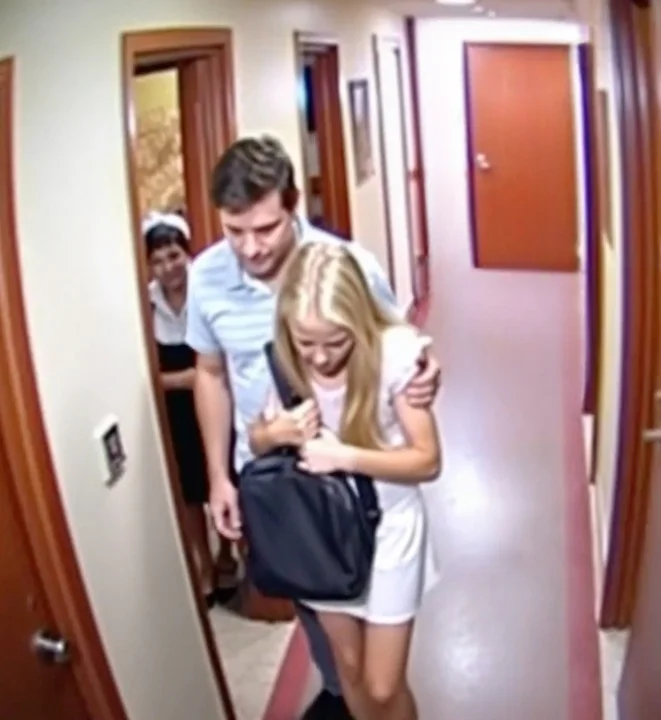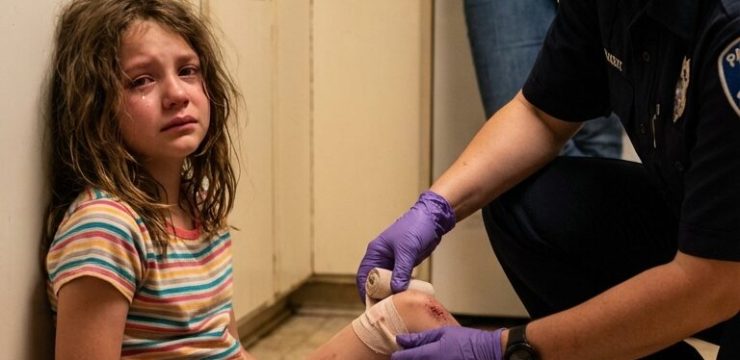The night had its own rhythm at the Sun Valley Inn—a quiet symphony of humming lights, distant highway noise, and the occasional ring of the lobby bell. Angela Carter had long grown used to it. For years, she had worked the night shift at this small roadside motel tucked along a lonely Texas highway. It wasn’t glamorous, but it was steady, predictable, and, in its own way, peaceful. That night, however, something felt different. Beneath the steady pulse of fluorescent lights, a sense of unease began to stir.

A young girl walked in, clutching a faded backpack like it contained her entire world. Her hair was unkempt, her clothes worn, and her eyes avoided every glance. Following closely behind was a man—well-dressed, polite, smiling in the way people do when they’re hiding something. He asked for a room far from the road, his tone calm, practiced, almost rehearsed. Angela’s instincts prickled. Something about their presence didn’t sit right. The girl’s silence spoke louder than words. Her fingers gripped the backpack so tightly that her knuckles turned white. She didn’t look afraid of where she was—she looked afraid of who she was with.
Angela tried to push the feeling away. She had seen all sorts pass through these doors—truckers, tourists, families, drifters. But as the man slid his credit card across the counter, she caught the girl’s eyes for just a second. There was a flicker there—a plea, a question, maybe even a silent cry for help. And just like that, the air in the lobby changed. Her grandmother’s voice echoed in her mind, the same words she had heard since childhood: “When your heart whispers warnings, listen.”
Angela handed over the keys to Room 112 and watched them disappear down the dim hallway. Hours crawled by. The neon sign outside buzzed and flickered, painting the lobby in soft flashes of red and blue. She pretended to focus on paperwork, but her attention never strayed far from that door. Every now and then, she thought she heard movement—footsteps, a muffled voice, the sound of something uneasy. Her hands trembled slightly as she poured another cup of coffee, her thoughts looping around the same question: Should I do something?
Curiosity gave way to instinct. She stepped outside, the night air thick with humidity. Through the thin curtains of Room 112, she noticed faint shadows—figures moving, whispers exchanged. They weren’t the kind of sounds that belonged to travelers resting for the night. There was tension there, something heavy and controlled. Angela’s heart began to race. She didn’t want to assume the worst, but deep down, she already knew something wasn’t right.
Her mind replayed news stories she had read—missing children, strangers who looked the other way, the moments when silence cost lives. The thought sent a chill through her. She returned to the desk and hesitated with her hand over the phone. What if she was wrong? What if she ruined someone’s life over a misunderstanding? But then, the girl’s eyes came back to her—the flicker of fear that had cut through that forced calm.
With a deep breath, Angela dialed the non-emergency number for the local sheriff’s office. Her voice trembled slightly as she explained what she’d seen. The dispatcher’s tone was calm but serious, promising to send officers to check things out. The wait felt endless. Every sound outside made her jump. She could hear the faint ticking of the wall clock, the slow drip from the coffee pot, and the steady beat of her own heart.
Then came the flash of red and blue lights cutting through the darkness. Two police cruisers pulled up quietly, engines low, headlights off. The officers moved with careful precision, speaking softly as they approached Room 112. Angela stood behind the counter, holding her breath. She heard a brief commotion—a door opening, a sharp voice, and then silence. Moments later, the girl emerged, clutching her backpack once again, but this time with trembling relief. Her eyes met Angela’s, and for a fleeting second, gratitude passed between them like an unspoken promise.
The man was taken away in handcuffs, his calm demeanor replaced by cold fury. The girl was gently escorted outside, wrapped in a blanket, her face illuminated by the pulsing lights. Angela wanted to say something, but no words came. She simply nodded, and the girl nodded back, tears glistening under the streetlamp.
News of the rescue didn’t make national headlines, but around town, people whispered about it. Some called Angela a hero. Others said she had just been lucky. But Angela knew it wasn’t luck—it was intuition, the kind of quiet knowing that can’t be explained, only felt. She hadn’t acted out of bravery or logic; she had simply listened to that inner voice that told her something was wrong.
A few days later, Angela returned home to find a small envelope in her mailbox. Inside was a handwritten note on lined paper, no return address, just six words that made her heart swell: “You gave me a second chance.” She folded it carefully and placed it in her bedside drawer, beside her grandmother’s old rosary. It became her quiet reminder that sometimes the smallest acts of courage can change a life forever.
From that night on, Angela never ignored her intuition again. She still worked the night shift, greeting travelers and checking rooms, but something inside her had shifted. She no longer saw her job as ordinary—it was a position of quiet vigilance, a place where she could make a difference, however small.
Angela Carter’s story isn’t one of dramatic heroism—it’s one of empathy, awareness, and the courage to act when something feels wrong. In a world that often rewards indifference, her actions remind us of the power of compassion. Sometimes, the call to help doesn’t come in a shout—it comes as a whisper, subtle but persistent. And if you listen closely enough, that whisper can save a life.
In a society filled with noise and distraction, it’s easy to overlook those quiet signals—the uneasy look, the small tremor in someone’s voice, the story behind a stranger’s silence. But Angela’s story proves that paying attention can be transformative. Her courage reminds us that intuition is not superstition; it’s the voice of empathy guiding us toward what’s right.
That night, in a forgotten motel along a Texas highway, one woman’s decision to listen turned into a miracle for someone else. And while the world may never know all the details, those who do will never forget the lesson: sometimes, salvation doesn’t arrive with fanfare or fame. It comes quietly, through ordinary people who choose to care.





